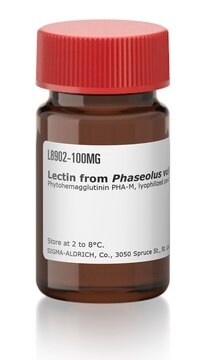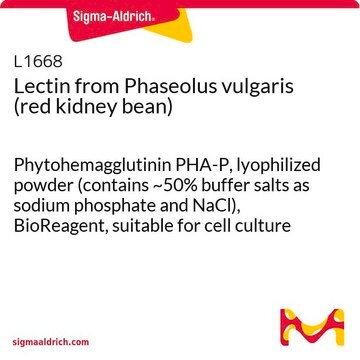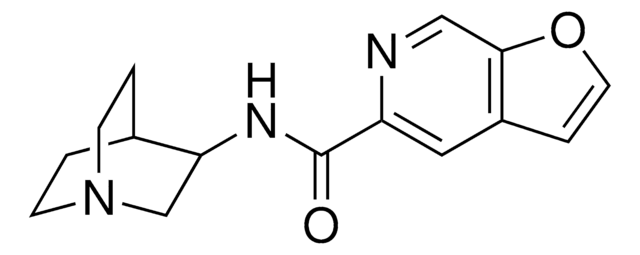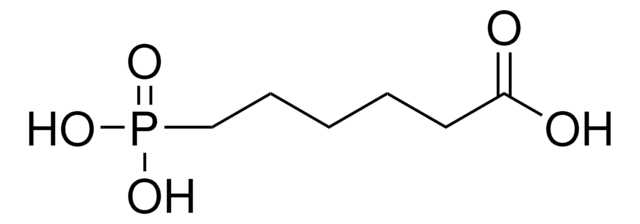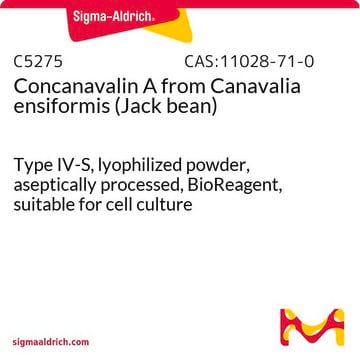11082132001
Roche
Phytohemagglutinin-M (PHA-M)
from Phaseolus vulgaris
Synonyme(s) :
PHA-M
Se connecterpour consulter vos tarifs contractuels et ceux de votre entreprise/organisme
About This Item
Code UNSPSC :
23201100
Produits recommandés
Niveau de qualité
Stérilité
non-sterile; 0.2 μm filtered
Forme
lyophilized
Conditionnement
pkg of 20 mg
Fabricant/nom de marque
Roche
Application(s)
hematology
Température de stockage
2-8°C
Description générale
Phytohemagglutinin (PHA), the lectin extract from the red kidney bean. PHA consists of five isolectins (L4E0, L3E1, L2E2, L1E3, L0E4) each being a tetramer held together by noncovalent forces. The subunits L (leukocyte reactive) have a high affinity for lymphocyte surface receptors, but little for those of erythrocytes, and are responsible for the mitogenic properties of the isolectins. E (erythrocyte reactive) is responsible for the erythrocyte-agglutinating properties.
Application
Phytohemagglutinin (PHA) is a potent mitogen used to stimulate cell proliferation in lymphocyte cultures.
Phytohemagglutinin-M (PHA-M) has been used in the activation of Jurkat and primary cells. It has also been used to treat polymorphonuclear blood cells(PMBCs)
Actions biochimiques/physiologiques
Phytohemagglutinin (PHA) has mitogenic and potent cell agglutinating activities. It binds to T-cell membranes and stimulates cell division and metabolic activity. PHA has the ability to stimulate close contacts between cell membranes.
Caractéristiques
Biological activity: <10 μg/ml for maximal stimulation of DNA synthesis (BrdU incorporation) with human peripheral blood lymphocytes.
Notes préparatoires
Working concentration: 2 - 10 μg/ml
Approximately 2 - 10 μg/ml for the stimulation of peripheral blood lymphocytes
Storage conditions (working solution): The reconstituted solution is stable for 2 weeks at 2 to 8 °C or for several months when stored in aliquots at -15 to -25 °C.
Approximately 2 - 10 μg/ml for the stimulation of peripheral blood lymphocytes
Storage conditions (working solution): The reconstituted solution is stable for 2 weeks at 2 to 8 °C or for several months when stored in aliquots at -15 to -25 °C.
Reconstitution
PHA-M should be reconstituted in sterile double-dist. water (final concentration: 2–10 mg/ml). Further dilution with medium or PBS (phosphate buffered saline).
Autres remarques
For life science research only. Not for use in diagnostic procedures.
Code de la classe de stockage
11 - Combustible Solids
Classe de danger pour l'eau (WGK)
WGK 1
Point d'éclair (°F)
does not flash
Point d'éclair (°C)
does not flash
Certificats d'analyse (COA)
Recherchez un Certificats d'analyse (COA) en saisissant le numéro de lot du produit. Les numéros de lot figurent sur l'étiquette du produit après les mots "Lot" ou "Batch".
Déjà en possession de ce produit ?
Retrouvez la documentation relative aux produits que vous avez récemment achetés dans la Bibliothèque de documents.
Les clients ont également consulté
Polyfunctional Melan-A-specific tumor-reactive CD8+ T cells elicited by dacarbazine treatment before peptide-vaccination depends on AKT activation sustained by ICOS
Ornella Franzese
Oncoimmunology, 5(5), e1114203-e1114203 (2016)
Gilles Darcis et al.
Cell reports, 30(7), 2284-2296 (2020-02-23)
The HIV latent reservoir forms the major hurdle to an HIV cure. The discovery of CD32 as marker of this reservoir has aroused much interest, but subsequent reports have challenged this finding. Here, we observe a positive correlation between the
Julia Kölle et al.
iScience, 25(6), 104440-104440 (2022-06-17)
The cytokine interleukin-3 (IL-3) acts on early hematopoietic precursor cells. In humans, Treg cells secrete IL-3 and repress inflammatory cells except for basophils. The present study aims to elucidate the contribution of IL-3 in the development and the course of
Tania Del Rivero et al.
Frontiers in immunology, 13, 977809-977809 (2022-12-16)
Extracellular vesicles isolated from human amniotic fluid (AF-EVs) have previously been found to modulate inflammation and macrophage infiltration in a mouse model. However, the effects of acellular amniotic fluid (acAF) or AF-EVs on the T-Cell immune response have not been
TRIM28 promotes HIV-1 latency by SUMOylating CDK9 and inhibiting P-TEFb
Ma X, et al.
eLife, 8, e42426-e42426 (2019)
Notre équipe de scientifiques dispose d'une expérience dans tous les secteurs de la recherche, notamment en sciences de la vie, science des matériaux, synthèse chimique, chromatographie, analyse et dans de nombreux autres domaines..
Contacter notre Service technique

